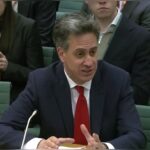Energy News Beat
The demand from the Biden administration and Gavin Newsom to make every car an EV in the near future suffered another devastating blow on Tuesday.
In October, Ford announced it was pulling the plug on a massive, $12 billion investment in electric car design and production. That came after the company announced massive losses on each EV it builds, thanks to enormous R&D costs and minimal consumer demand.
Then a group of nearly 4,000 car dealerships wrote a letter to Biden asking him to stop his relentless push for more electric cars. Citing low and declining interest in electric vehicles and the costs of retrofitting dealerships to handle charging infrastructure for cars no one wants, the dealers asked the administration to stop proposed changes to force manufacturers into making more of them.
Now one of the largest luxury car brands is also pressing pause on its EV strategy thanks to collapsing interest.
Audi’s new CEO announced Tuesday that the company would be imposing a “slowdown” in EV production and development to “avoid burdening” factories and dealerships, according to Electrek. Audi initially had announced that out of 20 new models through 2026, 10 would be electric. Instead, it’ll now be focusing more heavily on hybrids and internal combustion cars.
Biden’s rules working flawlessly, as always.
EV Demand Predictably Slows
It was always farcical to believe, as Biden and his allies on the political left do, that electric cars would achieve widespread adoption immediately.
While EV’s do have some advantages, namely fewer maintenance requirements, they come with enormous hurdles. Unless car buyers live in a house with a garage and are able and willing to pay for the installation of a home charger, they’re forced to rely on the public charging network.
And while Tesla’s figured out how to quickly build widespread charging infrastructure, no one else has. And Tesla’s chargers aren’t exactly fast, or uncrowded.
Electrify America and other national networks are slow to build, often full, don’t work, and even when charging at full speed, require 30 to 60 minutes to fully charge most electric cars. That also ignores the issues of battery degradation and loss of range that result from repeatedly charging them. Lack of repairability, difficulty in finding and transporting components, and the massive increase in accessible electricity make EV’s arguably less “sustainable” than other car options.
None of that’s stopped Biden or Newsom from demanding manufacturers lose money on cars no one buys. As more and more of them simply say no, it raises the question of if and when they’ll stop their nonsensical rules.
Based on their response to the border crisis and other major issues, the answer is likely never.
The post YET ANOTHER MAJOR CAR MANUFACTURER HITS PAUSE ON EV DEVELOPMENT appeared first on Energy News Beat.








